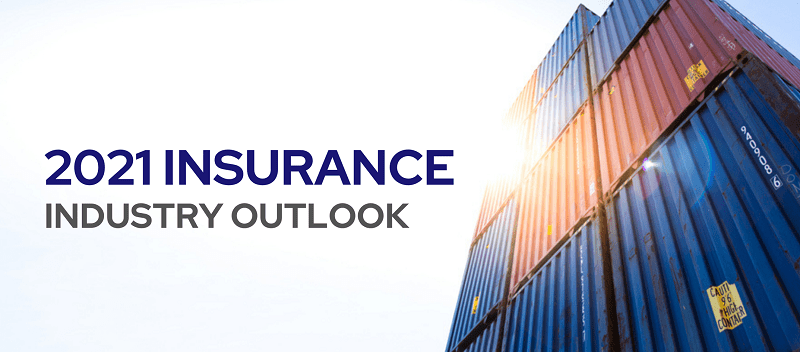December 18, 2020 | Cargo Insurance, Industry Insights
What to Expect in a Hard Insurance Market

The insurance industry is highly cyclical. A soft market cycle is defined by lower insurance premiums, broader appetite and coverage, increased capacity (the availability of high limits), and greater underwriting flexibility. Alternatively, a hard market is characterized by higher insurance premiums, diminished capacity, more conservative underwriting, and fewer carriers writing certain coverage lines and specific industries. For the last few years, the insurance industry has been experiencing a hardening of the market. Today we are well into a hard market across most insurance lines effecting the majority of industries. Insurance experts predict that the hard market will continue into 2021, further exacerbated by COVID-19 and other issues.
Insurers Hit Hard by Natural Catastrophes
There are several factors behind today’s hard insurance market. The frequency and severity of natural catastrophes such as fires, hurricanes and tornadoes, are among these factors, costing the insurance industry billions. According to Fitch Ratings, third-quarter natural catastrophe losses for the U.S. Property/Casualty insurance industry are the largest since the third quarter of 2017. For example, Hurricane Laura represents the largest individual loss event with estimated insured losses between $11 billion and $15 billion. In total, third-quarter events could add up to approximately $25 billion in insured losses, moving 2020 to an-above average year for natural catastrophe losses, says Fitch.
In addition, insurable losses from the summer’s civil unrest and rioting in the United States are estimated at $775 million. Wildfires on the West Coast are estimated to run between $4 billion and $8 billion in insured losses. The Beirut port explosion is estimated to cost insurers $3 billion.
These and other losses contribute to driving up Commercial Property rates, which are estimated to continue increasing by double digits for some classes of business well into 2021.
Social Inflation Contributes to Hard Market
Social inflation is a significant contributor to rising premiums and reductions in capacity in most liability coverage lines. Social inflation is a term used to describe the results of increasing litigation, broader definitions of liability, more plaintiff friendly legal decisions and larger compensatory jury awards. The median value of the top 50 U.S. verdicts in 2019 is estimated to be $88 million, which represents an increase of 62% compared to 2018, according to legal defense firm Lewis Brisbois. These massive verdicts are the result of an increasingly aggressive plaintiff bar, litigation funding, and anti-corporate sentiment among jurors.
Business Auto pricing, depending on the class of business, is anticipated to continue to increase at a rate of between 8% and 15%, due to social inflation, increased medical costs and rising vehicle repair expenses. Excess/Umbrella Liability is seeing even higher rates of increase due to continued deteriorating loss trends that are negatively impacting underwriting profitability for insurers. Catastrophic liability events stemming from auto accidents, wildfires, active shooter events and opioid claims are contributing to Excess Liability losses.
Cyber Liability insurance rates have also been impacted due to the frequency and severity of ransomware incidents.
Impact of COVID-19 on the Insurance Market
COVID-19 has exacerbated and extended the hard market conditions with significant losses in D&O, Employment Practices Liability Insurance (EPLI), Event Cancellation and other lines. Lloyd’s of London recently estimated that the global insured losses from the ongoing COVID-19 pandemic will exceed the market’s previous estimate of $107 billion and the related global economic downturn has caused interest rates to hover near zero %, decimating the investment return income which insurers have traditionally relied upon as an integral source of profit.
How the Hard Market Is Impacting the Cargo Industry
The cargo industry has undoubtedly been affected by today’s hard market after years of depressed insurance rates and loss severity. High-severity losses include those from fire, natural disasters and General Average declarations aboard mega vessels where container volumes are aggregated beyond levels previously encountered in the industry. As a result, many insurers have discontinued offering coverage for the cargo sector while others reduced capacity. Those insurers who remain have successfully introduced significant rate increases during this hard market and will continue to do so in 2021.
The Bottom Line
Insurers are relying upon premium adequacy to cover losses and generate profits by increasing rates, refining their risk appetite, reducing the capacity they are willing to offer, sharpening their underwriting, and incorporating restrictive language in their policies. This insurance trend will continue into 2021, so consumers should budget appropriately and work closely with their risk management partners to evaluate the efficacy of their risk management strategy.
You Can Rely on Us
Roanoke Trade is a widely recognized leader in the logistics and transportation related insurance and bond sectors. We maintain broad relationships with the most highly respected insurance companies & sureties in the industry so that even in a hard market, we can provide the most comprehensive and competitive risk transfer solutions to our valued clients who rely on our expertise to safeguard the longevity and financial wellbeing of their organizations.
We encourage clients to start the renewal process early so that we can perform a comprehensive risk evaluation, develop strategies and goals to effectively navigate this hard market and ultimately deliver a tailored solution which reflects the unique exposures, tolerances and budgets which are specific to each insured.
Please contact us at 1.800.ROANOKE (800.762.6653 ext. 1066) to explore the value which Roanoke can add to your risk management program.
Sources: Willis Towers Watson, Moody’s, RMS, Insurance Journal, CIAB, NMU






